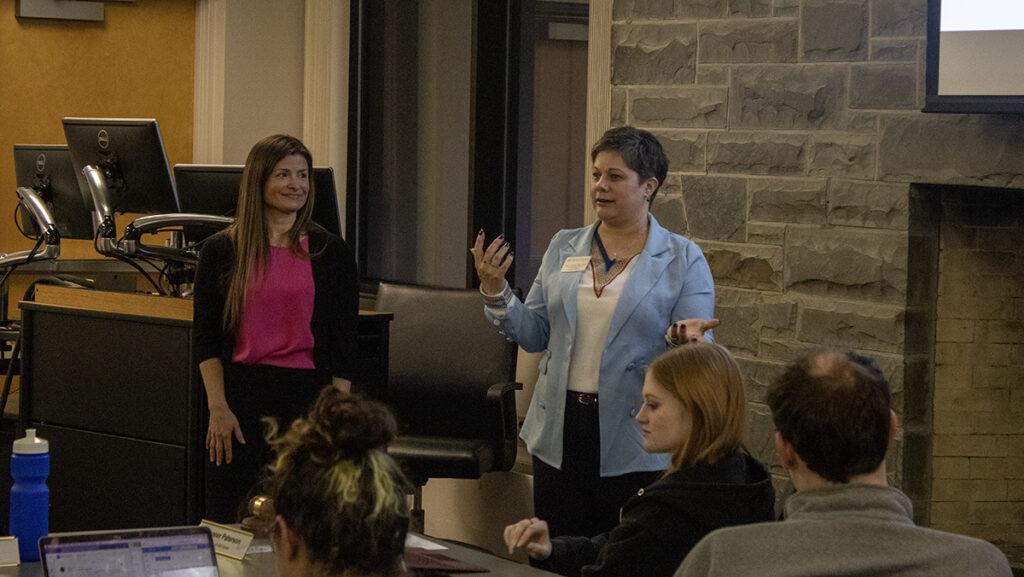Members of the Student Governance Council met April 3 to discuss technology advances at Ithaca College with the Innovative Technologies Committee. The council also passed a bill and brainstormed a mission statement for the SGC.
Chief Information Officer Dave Weil, Casey Kendall, executive director of applications and infrastructure, and Jenna Linskens, director of learning and innovative technologies from the college’s Information Technology division, discussed confirmed and potential changes to make student’s interactions with technology at the college more effective.
“We heard your feedback and we took your concerns very seriously,” Weil said. “Some of these are longer-term, but we are hearing your concerns.”
DegreeWorks, the website used when tracking the progress of a student’s degree, is currently going through a major update. Weil said an overhaul has been scheduled and executed for the past year. Kendall said this update intends to make measurement of current credits obtained and needed for degree progress easier, cleaning up the user interface and mobile support.
The IT Committee sent out a survey to the entire campus community about cell phone reception and Wi-Fi connectivity on campus. The survey had 90 respondents. IT typically does not get involved with cellular issues, but because of current student feedback on issues, IT is looking for solutions. Along with reception, adding outdoor Wi-Fi in certain areas is also a high priority in varying parts of campus. Wi-Fi directly outside of residential halls may have to wait longer for implementation.
The representatives of IT discussed the software with the SGC. These discussions focused on members of the SGC’s personal experiences with the programs. IT is concerned about supporting students’ use of the tools, Artificial Intelligence education and where the system may be pulling information, and turning this system into a useful tool.
“Generative AI and ChatGPT is not going away. It’s going to infiltrate everything you do,” Linskens said.
Weil said IT is aiming to use ChatGPT as an educational device. This includes teaching students how to use ChatGPT to help them with their coursework and educating professors on how AI works if they want to use these new technologies in their teaching.
“I think starting now and trying to learn about what the tools can do and then what you can do to leverage those tools to do bigger and greater things than you could do without them is really the secret to succeeding as we go forward,” Weil said.
President La Jerne Cornish and Weil went to Apple headquarters and Microsoft headquarters in Cupertino, California, to discuss technology in higher education. Weil said he learned how to leverage technology advances to better serve students, improve mobile device connectivity and make security more convenient for students, like using a cellular device as an ID card.
“We spent a lot of time thinking about how students feel,” Weil said. “It’s interesting how these companies can improve the experience on campuses like Ithaca. … We are continuing to partner with these companies.”
Senate Chair senior Austin Ruffino asked about what is next for the college when it comes to updating services, and Weil said Homerconnect may be the next software getting an overhaul, although not in the next year or two.
SGC moved on to a bill proposed by Ruffino on behalf of the Organizational Review Committee about restructuring the executive council. Ruffino said this bill will be a minor restructure before the planned SGC constitution overhaul later in the semester.
There are five primary seats on the executive board: president of the student body, vice president of campus affairs, vice president of academic affairs, vice president of business and finance and vice president of communications. Ruffino said anybody currently running for one position needs to find four running mates for other positions to form a unit.
Ruffino said the purpose of having students run as teams was to create a clear, common goal so bills can be passed earlier. This new bill allows senators to apply for one role individually without needing running mates.
“We will lose the benefit of a cohesive platform and a group of people that may already know each other and can work together, but we will gain a lot more flexibility and freedom in what you want to run for,” Ruffino said.
The bill passed unanimously.
During officer reports, senior Grace Madeya, president of the student body, and senior Esther Moore, Residence Hall Association designee, said they talked with the Office of Residential Life about vending machines.
“[ResLife staffers] are sending out a mass survey to all students in the coming week to ask about thoughts on vending in res halls to see if there is a common theme,” Madeya said.
Finally, Ruffino said the Organizational Review Committee is looking to find a mission statement for SGC. Mission statements are used to determine the goal of a potential or current organization. Ruffino said that even though student organizations need a mission statement before requesting funding from the SGC, the SGC itself does not have one. Members of the SGC were asked to come up with ideas for the next meeting.
“Every student organization that requests funding needs to have a mission statement before requesting funding from us, then we looked up ours and were like, ‘Hmm, we don’t actually have our own,’” Ruffino said. “It should just be something that everyone can think of right away when they think of SGC.”
The SGC is the sole representative body for the Ithaca College student community. The SGC can be contacted at [email protected].








